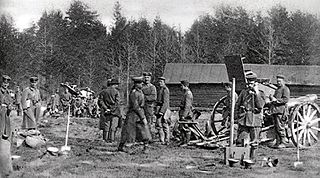
A civil war is a war between organized groups within the same state . The aim of one side may be to take control of the country or a region, to achieve independence for a region, or to change government policies. The term is a calque of Latin bellum civile which was used to refer to the various civil wars of the Roman Republic in the 1st century BC.
Lists of battles contain links to sets of articles on battles. They may be organized alphabetically, by era, by conflict, by participants or location, or by death toll. See Category:Battles for a complete list of articles on battles.
This article provides a list of articles which contain lists of wars and conflicts.
A world war is "a war engaged in by all or most of the principal nations of the world". The term is usually reserved for two major international conflicts that occurred during the first half of the 20th century: World War I (1914–1918) and World War II (1939–1945).
A conflict of interest (COI) is a situation in which a person or organization is involved in multiple interests, financial or otherwise, and serving one interest could involve working against another. Typically, this relates to situations in which the personal interest of an individual or organization might adversely affect a duty owed to make decisions for the benefit of a third party.

The American Indian Wars, also known as the American Frontier Wars, the First Nations Wars in Canada, and the Indian Wars, were fought by European governments and colonists in North America, and later by the United States and Canadian governments and American and Canadian settlers, against various American Indian and First Nation tribes. These conflicts occurred in North America from the time of the earliest colonial settlements in the 17th century until the early 20th century. The various wars resulted from a wide variety of factors. The European powers and their colonies also enlisted allied Indian tribes to help them conduct warfare against each other's colonial settlements. After the American Revolution, many conflicts were local to specific states or regions and frequently involved disputes over land use; some entailed cycles of violent reprisal.

A declaration of war is a formal declaration issued by a national government indicating that a state of war exists between that nation and another. A document by the Federation of American Scientists gives an extensive listing and summary of statutes which are automatically engaged upon the United States declaring war.
Ethnic violence is a form of political violence expressly motivated by ethnic hatred and ethnic conflict. Forms of ethnic violence which can be argued to have the character of terrorism may be known as ethnic terrorism or ethnically-motivated terrorism. "Racist terrorism" is a form of ethnic violence dominated by overt racism and xenophobic reactionism.
Revolutionary War(s) may refer to:
Conflict may refer to:

The Geneva Conventions are four treaties, and three additional protocols, that establish international legal standards for humanitarian treatment in war. The singular term Geneva Convention usually denotes the agreements of 1949, negotiated in the aftermath of the Second World War (1939–1945), which updated the terms of the two 1929 treaties and added two new conventions. The Geneva Conventions extensively define the basic rights of wartime prisoners, established protections for the wounded and sick, and provided protections for the civilians in and around a war-zone; moreover, the Geneva Convention also defines the rights and protections afforded to non-combatants. The treaties of 1949 were ratified, in their entirety or with reservations, by 196 countries. The Geneva Conventions concern only prisoners and non-combatants in war; they do not address the use of weapons of war, which are instead addressed by the Hague Conventions of 1899 and 1907, which concern conventional weapons, and the Geneva Protocol, which concerns biological and chemical warfare.
The following outline is provided as an overview of and topical guide to war:

An anti-war movement is a social movement, usually in opposition to a particular nation's decision to start or carry on an armed conflict, unconditional of a maybe-existing just cause. The term anti-war can also refer to pacifism, which is the opposition to all use of military force during conflicts, or to anti-war books, paintings, and other works of art. Many activists distinguish between anti-war movements and peace movements. Anti-war activists work through protest and other grassroots means to attempt to pressure a government to put an end to a particular war or conflict or to prevent it in advance.